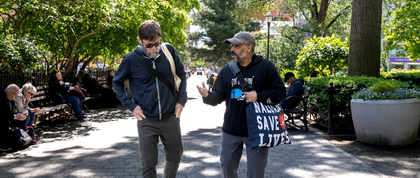
NYU School of Global Public Health's Alex Bennett and Franklin Taveras. Photo by Tracey Friedman
NYU researchers meet at-risk veterans where they are to offer services and support
Franklin Taveras can often spot a veteran on the streets of New York City before they even exchange words.
“Sometimes I’ll see how a guy has his boots laced and I’ll know he’s airborne,” Taveras says, referring to the distinctive way that paratroopers secure their boots.
“When veterans see me, some say, ‘You stand like you're at attention’ because I stand with my thumbs facing forward,” adds Taveras, who joined the Marines in the 1980s. “They teach you that in boot camp. These are little things that other veterans pick up on.”
These small exchanges can lead Taveras into conversations with at-risk veterans focused on what they have in common—their military service—rather than their substance use or unstable housing.
After leaving the Marines, Taveras himself struggled with heroin and crack use. He remembers the support that he received from an outreach worker: a sandwich, water, clean syringes, and a kind conversation that was free of judgment. Following his journey to recovery, Taveras has devoted much of the past three decades to doing similar outreach.
Through this work, he met Alex Bennett, director of the Opioid Overdose Prevention Program at the NYU School of Global Public Health and founder of NYU’s Project Respond, which seeks to help unstably housed veterans, among other at-risk groups, prevent and respond to drug overdose. Bennett started working on overdose prevention among veterans in 2010, when US veterans were twice as likely to die of an overdose than the general population, and has since published two dozen papers exploring why some veterans use drugs to cope with physical, social, and psychological pain.
Over the past decade, Bennett and fellow NYU researcher Luther Elliott have received funding from the National Institutes of Health to develop and evaluate a program to reduce opioid-related harms among veterans. They also have support from the New York City Department of Health and Mental Hygiene to distribute naloxone (also known by the brand name Narcan), a nasal spray that rapidly reverses overdoses. Focus groups, interviews, and surveys with more than a thousand veterans, along with input from veteran team members Juan Cortez, Erin Kirk-Cuomo, Kaream Ellington, Kevin Collins, and Darius Marcus, led to the peer-led overdose prevention program currently underway in New York City.
The program’s secret weapon: veterans themselves, including Taveras and Gus Stavroulakis, who served in the Navy for a decade and is currently a medic in the National Guard. Using a peer model—veterans reaching out to other veterans—the goal is to educate participants and provide them with resources to reduce risky behaviors that can lead to overdoses.